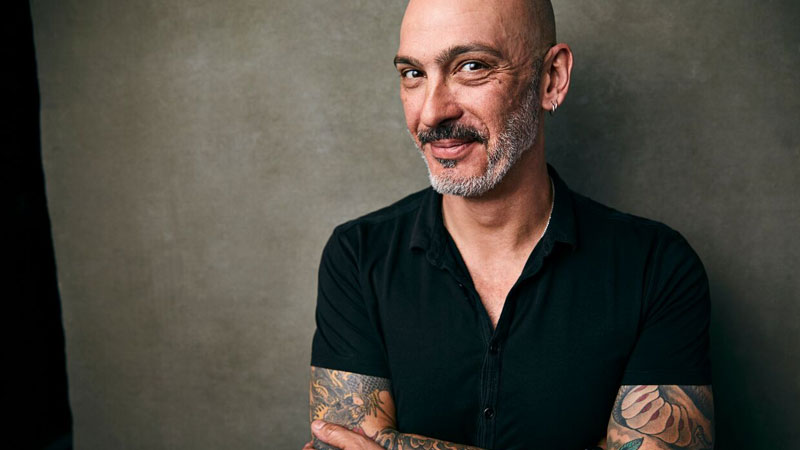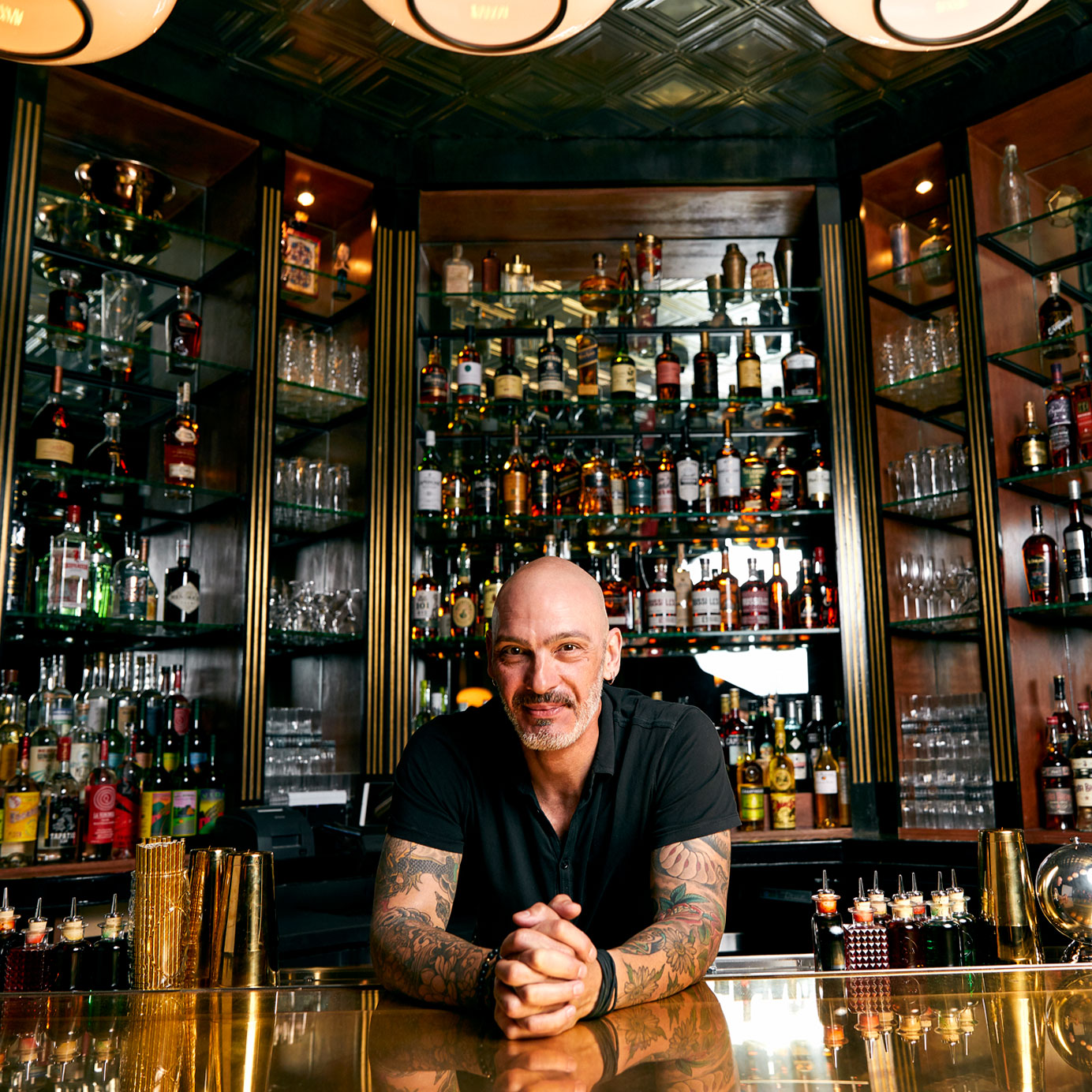
It hit him all at once during a visit to Bulgaria. An epiphany transformed Dushan Zaric’s approach to making and selling drinks in the swanky bars he’s opened everywhere from New York to Los Angeles.
A refugee who landed in NYC in 1996 with $2,000 in his pocket, Zaric launched Manhattan’s award-winning Employees Only cocktail bar in 2004, and later co-founded The American Bartending Institute of New York as well as the TriBeCa restaurant Macao Trading Co.
He sat down with VinePair as he was on the cusp of opening his new, reservation-only concept, Bar Alta, on the mezzanine level of L.A.’s iconic Hotel Figueroa. Months earlier, he had imported Employees Only to Los Angeles. It debuted in Singapore, too, and has plans to open in Sydney, Australia.
Zaric’s a-ha moment came when he was in Sofia, Bulgaria in 2017. The bars he visited were as precious as the best ones in London, or anywhere, really, Zaric thought. It led him to a conclusion about running a successful bar.
The drinks? They aren’t really as important as you think.
That is to say, a perfectly poured brew; a cocktail with a far-out recipe and voluptuous garnishes; bold, beautiful wines of sparking, red, and white; it doesn’t matter whatever it is. For a bartender as in love with the work as Zaric is, the drinks are just table stakes.
“This whole thing has reached a point where, you know, I don’t think guests return because your drink is better than somebody else’s,” he says. “If that was the case, then machines would do a much better job than any human.
“I don’t believe the mastery of cocktailing is in just following recipes, which, for me, are always guidelines anyway,” he says. “A bartender, I think more than anything, is supposed to provide a human experience to their guests.”
It’s on his mind as he continues to build up Employees Only LA and in outposts worldwide. His is not the only high-profile cocktail empire going global. New York’s Death & Co. opened a Denver outpost in The Ramble Hotel in 2018, and Chicago’s experimental cocktail establishment The Aviary opened at the Mandarin Oriental in New York in 2017. New York cocktail lounge Please Don’t Tell opened an outpost in Hong Kong in 2018, and Broken Shaker Miami opened locations in Los Angeles, NYC, and Chicago.
These moves are important to Zaric, who talks as much about spaces as he does the drinking that goes on inside them.
“Restaurants and bars and public houses were always kind of a refuge, right? A place where you come to kind of forget about the worries of your day and the struggles and the obstacles you face every day,” Zaric says. “Bars and restaurants are places where people should be approved and accepted just how they are.”
He didn’t always have such a philosophical attitude toward the job. (“I was an angry bartender once upon a time, when I was young,” he says.) Today’s enlightenment is the culmination of what’s been a pretty textured life. Zaric fled the war in his home country, Serbia, during the 1990s. His first job in New York City was as a bouncer at a strip club, to which he wore a tuxedo every night.
He’s also weathered public scrutiny. In 2016, an Employees Only Singapore advertisement calling for “badass cocktail waitresses” led to accusations of gender-preferential hiring. Ultimately, Zaric stepped back from publicly fronting the liquor business, The 86 Company, which published the ad, and the bar later apologized for causing “harm and offense.”
All of which is to say, Zaric has made very public mistakes. Now, on the eve of a major opening, he is focused on how to pull off the bartender’s version of alchemy — how to make pouring a drink feel like the act of a friend you never knew you had.
“Every concept has a different framework within which you can give birth to this human experience,” Zaric says. “You can have a very precious, experimental cocktail bar where the bartenders use all kinds of tools and techniques to extract flavors and blah blah blah. All that is great, and I love the creative moments. I love the ability of the bar teams to be inspired and engaged in that way… [But] at the end of the day, if the guest doesn’t walk out with a smile, a bigger smile than they had on their face when they walked in, then we have really not done anything extraordinary.
“We’ve just been yet another watering hole where you came in, paid $20 for your drink, and we haven’t done our job, really, because we haven’t made your day a little better, you know?”
This might sound like a strange pronouncement from the co-founder of an establishment like Employees Only. The famed speakeasy behind a fortune teller’s window was part of a fleet of downtown NYC bars that helped America’s craft cocktail movement really take off. Its early-2000s aesthetic — beautifully composed cocktails made by bartenders wearing suspenders, victory rolls, mustache wax, or some combination thereof — influenced generations of successors. In 2011, Employees Only won the prestigious “Best Bar in the World” trophy at Tales of the Cocktail.
These days, Zaric’s usual schedule is waking up early, meditating, having some coffee and breakfast, and then heading to the Hotel Figueroa. He has been involved in the hotel project for more than two years. (“And it’s a beast,” he says.) It’s got four bars, two restaurants, and a private event space Zaric thinks he might help activate down the line. The menus at Bar Alta feature Basque-inspired cocktails that Zaric makes from a $5,000 bespoke bar cart he spent over a year designing.

He sees cocktail culture at large in the U.S. heading toward more of a social experience. Bartenders aren’t just there to pour liquor, Zaric figures, they should be jacks of every trade. They’re supposed to be social workers, counselors, friends, philosophers, listeners, and a lot more.
“Cocktail culture comes from the United States, as we know it today, and bars and restaurants are in my mind very much like a modern kind of shamanistic practice,” he says. The need for a good drink at a good bar served by a good bartender is something that’s hardwired into humans, he believes.
Let’s say it’s the end of a long day, one that some ancient human ancestor has spent hunting and foraging for food. They return to the village and settle in around the fire. The shaman hands out a fermented brew and starts listening to people’s stories about the day and helping them make sense of the universe.
“It’s in our genes,” Zaric says. “We need a safe space like that where we can process our day. Alcohol is a spiritual solvent in a lot of ways.”
When you’ve been in the business as long as he has, you arrive at certain truths. Nobody out there has the best drink. And it wouldn’t matter if they did. What customers need more than anything from a bar is some company while they celebrate milestones, go on dates, catch up with friends, or simply pass some time before returning to the world outside.
“I’ve worked with people who look at the hospitality industry as a bottom-line affair, where, you know, it’s all about cutting costs and running it as efficiently as possible,” Zaric says. “I’ve worked with people who have a different philosophy and ethos about hospitality. Mine is about creating this nonverbal energy.
“We make them feel like there’s something extraordinary going on.”
